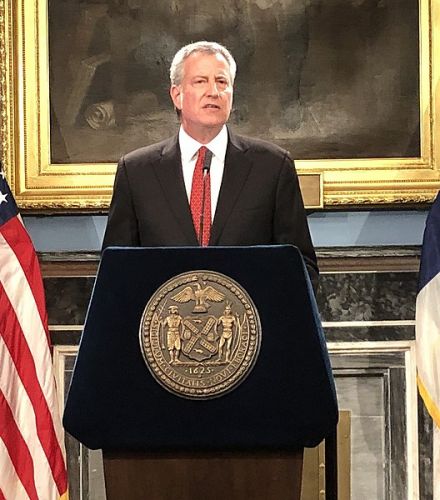NEW YORK (BRAIN) — Two days before Gov. Andrew Cuomo is expected to propose a new e-bike bill, New York City Mayor Bill de Blasio said the city's enforcement of delivery workers using throttle-control e-bikes is just.
De Blasio addressed the e-bike debate Monday after a news conference on an unrelated topic. When asked whether statistics show throttle e-bikes — favored by many food delivery workers in Manhattan — create a bigger safety risk than pedal-assist bikes, he said, "I keep coming back with something that is bluntly, in my view, better than data. It is common sense," the New York Post quoted de Blasio. "I have seen them with my own eyes as have so many people I've talked to all over the city."
According to Streetsblog — which covers the city's transportation and policy developments in an effort to improve conditions for walking, biking, and transit — 31 of the more than 45,000 motor vehicle collisions resulting in injuries in 2018 were caused by e-bike riders (.07%).
On Dec. 26, Cuomo vetoed legislation that would have given all classes of e-bikes, including those with throttle-control, the same rights of the road as traditional bicycles throughout the state. Only pedal-assist bikes are allowed in the city.
When Cuomo announced the veto, citing an absence of a helmet and other safety requirements, he said he would propose a new bill Jan. 8. After the state legislature passed the e-bike and e-scooter bill in the summer, Cuomo noted safety concerns with food delivery workers using throttle-control e-bikes. De Blasio began an initiative in 2014 to curb dangerous driving, which included e-bike riders. Throttle-activated e-bike riders can be fined as much as $500 and can have their bikes seized.
"They go on sidewalks; they go the wrong way down the street; they go too fast," de Blasio said of delivery riders, according to the Post.
Transportation advocates have said the crackdown on delivery workers who depend on e-bikes for their livelihood is unjust. Do Lee of the Biking Public Project tweeted the mayor "fosters fear mongering."
Cuomo tweeted after his veto that his e-bike bill will not be a choice "between legalizing e-bikes and safety, and I will propose a bill that does both."
Larry Pizzi, who chairs the PeopleForBikes' e-bike committee, is interested in what the governor will propose. The committee was in contact with state legislators before the bill was sent to Cuomo.
"We felt there were problems with the bill," Pizzi said. "We've been trying to get our three-class bill passed in the state for five years. We started with New York and California. California was passed in the first legislative session. And we've been working on New York ever since."
Defining e-bike classes were chief among concerns. PeopleForBikes defines Class 1 e-bikes as those providing assistance only when pedaling and turning off when reaching 20 mph; Class 2 bikes featuring a throttle-activated motor turning off when reaching 20 mph; Class 3 bikes providing assistance only when pedaling and turning off when reaching 28 mph.
In the absence of local ordinances, PeopleForBikes recommends Class 1 and 2 e-bikes for paths and trails and Class 3 only on roadways. The group said the New York bill created uncertainty around access on bike paths, failed to define Class 3 e-bikes, and prohibited passengers from riding on all e-bikes, including cargo e-bikes.
"The big problem was Class 2 (in the New York bill) didn't meet the same definition as Class 2 under our three-class bill, which is now in half of the states in the union," Pizzi said. "It will be very very confusing if there was a different definition in New York State."
New York State's proposed legislation classified e-bikes as those with pedal-assist with 20 mph maximum, throttle-control with 20 mph maximum, and throttle-control with 25 mph maximum. E-scooters would have been capped at 20 mph. Riders would need to be at least 16 years old, and local municipalities would decide if they would be allowed on sidewalks. E-scooters would not have been allowed in Manhattan because it's the city's busiest borough.
"When the governor threw up red flags initially, we offered up commentary about what kind of changes should be made," Pizzi said. "It will be interesting to see whether Cuomo takes to heart the commentary we offered up in these revisions. They also had helmet requirements, and not being able to carry a younger rider on a cargo bike as a passenger, which is crazy because if there's one place in the country where electric cargo bikes could make a huge impact, it would be in New York. We offered those things as suggestions, so we're keeping our fingers crossed that the governor puts some stock in those suggestions."
.@NYCMayor fosters fearmongering xenophobia by continually painting immigrant delivery #ebike workers as unsafe based little more than his "common sense."
As if powerful & privileged people have never rationalized discrimination & harm as "common sense."#DeliverJustice https://t.co/f1EvkFxvIO— Dr. Do Jun Lee 이도준 (@dosik) January 6, 2020


